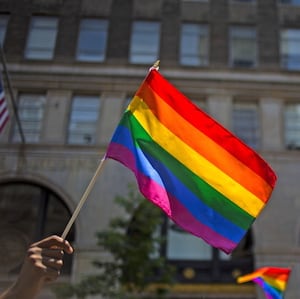Elliot Page sat down for his first on-camera interview with Oprah Winfrey, discussing how he felt it was “crucial” to come out as transgender last year and how he can now breathe a sigh of relief when he looks at the mirror, to see himself and say, “There I am.”
During the 45-minute conversation that aired Friday, he also revealed how years of debilitating depression and anxiety over pressures to present himself as feminine once led him to collapse on the night of the Inception premiere in Paris, after he was presented with dresses to wear.
But to 34-year-old Page, the most important aspect of his talk was to deliver on his promise to use his platform to bring awareness and advocate for the rights of the transgender community, especially trans youth. “You really hope people can just look into their hearts,” he said. “You really hope people could just listen and educate themselves with the real information and have empathy and compassion.”
The Oscar-nominated actor, known for his roles in Juno, Inception, and Netflix’s The Umbrella Academy, came out as a trans man in December in a moving statement. Giving his new pronouns as he/them, Page wrote, “I feel lucky to be writing this. To be here. To have arrived at this place in my life. I can’t begin to express how remarkable it feels to finally love who I am enough to pursue my authentic self.”
In the months since, Page spoke with Time and became the first trans male to grace the magazine’s cover, discussing how his top surgery was not only life-changing, but lifesaving. This week he told Vanity Fair of his newfound “joy and excitement” about this new chapter.
But when Page sat down with Oprah for her series The Oprah Conversation, now streaming on Apple TV+, it was the first time fans were able to hear him describe his life-long struggle and the relief at being able to share his truth, with Page breaking down into tears at some moments.
The pre-taped interview was filmed remotely, with Oprah in Hawaii and Page in Toronto, but a seamless merged screen helped make it appear as if they were in the same room. Before the chat kicked off, Page said he wanted to make clear he was only speaking from his experience. In interview preparation, Oprah explained she watched Disclosure: Trans Lives on Screen and spoke to Nick Adams, GLAAD’s director of transgender representation.
Reflecting on his announcement from last year, Page said he felt it was “crucial” to share his identity with the world, citing the need for the Equality Act to be passed. The bill would amend the Civil Rights Act of 1964 to prohibit discrimination based on sexual orientation and gender identity in relation to employment, education, housing, and loans, among other categories.
But while President Joe Biden urged Congress to pass the bill on Wednesday, more than 250 anti-LGBTQ bills have been introduced in state legislatures just this year, according to the Human Rights Campaign.
Oprah highlighted several states’ anti-trans bills that would prohibit trans girls from participating in sports and deny trans people from accessing healthcare based on religious freedom. Oprah also brought up Texas’ SB 1646 bill, which would reclassify the term “child abuse” to apply to parents who support their child’s transition.
“In this time we’re in right now and especially with this horrible backlash we’re seeing toward trans people, particularly trans youth, it really felt imperative to do so,” Page said.
“I believe people want to erase trans people, they don’t believe we exist and they don’t want us to exist,” he added. “Right now, the main tactic is to attack trans kids. It’s unfathomable to me to desire to do something like that. These kids are being used as political pawns to fight the Equality Act, which the Republicans don’t want passed.”
Speaking directly to trans youth, Page said, “I want to tell them that I see them, that they exist, that they are real. I know for me, looking at the attacks against trans kids and the rhetoric, I can’t imagine what it feels like. I just want kids to know that they’re loved and I’m going to continue to do what I can to try and help this society shift how it treats transgender people.”
Reflecting on his own experience growing up and never feeling at home within his body, Page said he felt small moments of freedom when he was allowed to cut his hair short or was able to wear boys swimming trunks.
But as he began a career in acting, he felt pressured by society to fit into a feminine mold. When Page was nominated for an Oscar in the surprise indie hit Juno in 2008, he attended the Academy Awards. But he couldn’t even bring himself to look at the photos from the red carpet afterward.
“I remember it felt so impossible to communicate with people how unwell I was, because obviously there is so much excitement,” he explained. “The film unexpectedly became a big hit, I became quite known… I felt like I almost couldn’t express just the degree of pain that I was in.”
“So, the Oscars, for example, I could not look at a photo from that red carpet. People might watch this and be like, ‘Oh my gosh, this person is crying about the night where they went to the Oscars.’ I think that prevents the ability to allow yourself to not just feel the pain, to reflect on the pain.”
Page’s anxiety only grew with the years. He admitted sometimes he’d collapse due to sudden panic attacks. On the night of the Inception premiere in Paris in July 2010, Page said he suffered another one of those attacks.
“The period where I was shooting and promoting Inception, because there was so much press and so many premieres all around the world, I was wearing dresses and heels to pretty much every single event,” he explained.
“We were in Paris for the premiere and my manager, who’s like family to me, we’re so close and she couldn’t be more supportive and incredible, but there used to be a lot of tension back then. She really believed she was doing the right thing for me, helping my career by encouraging the dresses and the heels. We got back to the room and she was like, ‘I have a surprise.’ I already had one dress picked out and I went in and there were three dresses laid out, like new dresses to see.”
“I lost it, it was like a cinematic moment, kind of like a thing that would be in a movie. That night after the premiere and at the after party, I collapsed. That was something that happened frequently in my life, usually corresponding with a panic attack.”
Page credits his “life-changing” and “lifesaving” male chest reconstruction surgery in helping to transform the way he sees himself now. To him, the most joyful part of this new chapter is stepping out of the shower.
“The towel is around your waist and you're looking at yourself in the mirror and you’re just like, ‘There I am,’” he said. “I'm not having the moment where I’m panicked, I’m not having all these little moments… Just being in a T-shirt, being able to touch my chest and feel comfortable in my body for the probably the first time... tears of joy.”
Since December, Page said he’s had an “explosion of creativity,” explaining how he just finished writing his first screenplay, recorded an EP with a friend, and has read countless books.
“I guess from where I’m sitting now, all I know is the degree of comfort, the sense of home, the ability to be present, feels so profound and life-changing,” he said. “I look forward to getting to move through the world in that way and continue to become the person that I've always wanted to be, and that I hope to be.”


